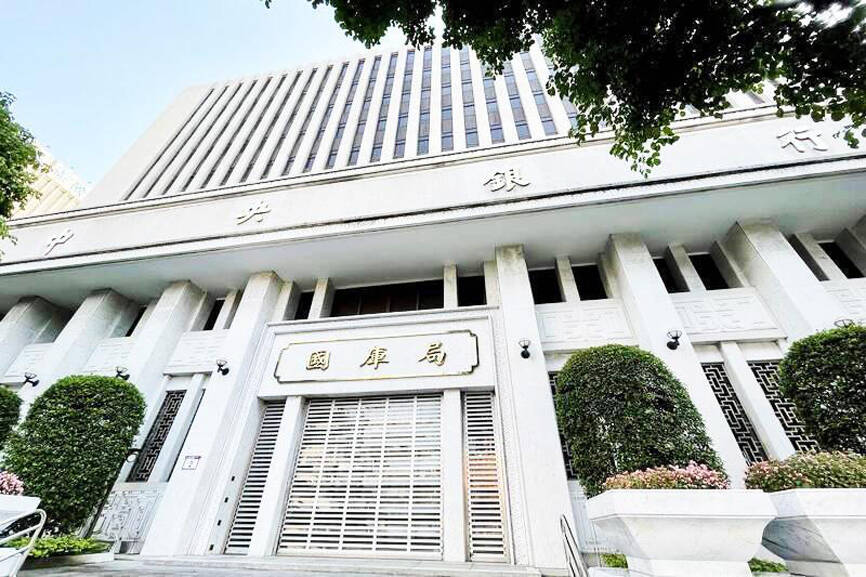The central bank yesterday suggested that the government approach Taiwan’s trade surplus with the US carefully, as the administration of US President Donald Trump plans to introduce reciprocal tariffs to address its trade imbalances with other nations.
Central bank Deputy Governor Chu Mei-lie (朱美麗) is to give a special report to the legislature’s Finance Committee today on potential US tariff hikes and Taiwan’s inclusion on the “Dirty 15” list of trade surplus nations.
Last year, the US recorded a US$73.9 billion trade deficit with Taiwan, making it the sixth-largest trade surplus source after China, Mexico, Vietnam, Ireland and Germany, the central bank said.

Photo: George Tsorng, Taipei Times
The central bank attributed the trade surpluses to intensifying US-China trade disputes and technology competition, the strengthening of cybersecurity and an ongoing artificial intelligence (AI) boom that together have boosted US demand for chips and information communications technology products.
“The vast amount of trade surplus raises concerns over trade frictions with the US,” the bank said.
By measure of simple average calculations, Taiwan’s tariffs are 3.2 percentage points higher than the US, although the gap is lower than that of India, South Korea, Thailand, Vietnam, China and Indonesia, the central bank said, citing WTO data.
However, Taiwan has lower tariffs than the US if judging by trade-weighted average tariffs, providing room for negotiation, it said.
Taiwan imposes relatively high tariffs on US agricultural products than non-agricultural products. It shipped US$890 million of agricultural products to the US last year, while importing US$3.69 billion, resulting in a trade deficit of US$2.8 billion in this sector, the central bank said.
That discrepancy could serve as negotiation leverage on the part of Taiwan during trade discussions, it suggested.
Canada and Mexico would take a hard hit from US tariffs, while Taiwan would see moderate repercussions, according to a study by Standard & Poor’s Global Ratings, after Trump threatened to impose a 25 percent tariff on its neighbors and an extra 10 percent tariff on other trade partners, the central bank said.
The US tariffs, if realized, would slow the world economy this year, the study added.
The US Department of the Treasury has sought to protect US interests and business sectors by releasing a semi-annual currency report in April and October to assess whether major trade partners manipulate their currencies to advance unfair trade practices, the central bank said.
Countries meeting two out of three criteria — a significant trade surplus, a large current account surplus and exchange rate interventions — are placed on the currency watch list, it said.
Taiwan has been on the watch list, but the central bank emphasized Taiwan’s foreign exchange interventions are intended to maintain currency stability rather than gain trade advantages, it said.
Countries that meet all three criteria are subject to economic sanctions.
The central bank said it keeps free and effective communication with the US, adding that the two sides would continue economic and currency policy exchanges based on mutual understanding.

In Italy’s storied gold-making hubs, jewelers are reworking their designs to trim gold content as they race to blunt the effect of record prices and appeal to shoppers watching their budgets. Gold prices hit a record high on Thursday, surging near US$5,600 an ounce, more than double a year ago as geopolitical concerns and jitters over trade pushed investors toward the safe-haven asset. The rally is putting undue pressure on small artisans as they face mounting demands from customers, including international brands, to produce cheaper items, from signature pieces to wedding rings, according to interviews with four independent jewelers in Italy’s main

Japanese Prime Minister Sanae Takaichi has talked up the benefits of a weaker yen in a campaign speech, adopting a tone at odds with her finance ministry, which has refused to rule out any options to counter excessive foreign exchange volatility. Takaichi later softened her stance, saying she did not have a preference for the yen’s direction. “People say the weak yen is bad right now, but for export industries, it’s a major opportunity,” Takaichi said on Saturday at a rally for Liberal Democratic Party candidate Daishiro Yamagiwa in Kanagawa Prefecture ahead of a snap election on Sunday. “Whether it’s selling food or

CONCERNS: Tech companies investing in AI businesses that purchase their products have raised questions among investors that they are artificially propping up demand Nvidia Corp chief executive officer Jensen Huang (黃仁勳) on Saturday said that the company would be participating in OpenAI’s latest funding round, describing it as potentially “the largest investment we’ve ever made.” “We will invest a great deal of money,” Huang told reporters while visiting Taipei. “I believe in OpenAI. The work that they do is incredible. They’re one of the most consequential companies of our time.” Huang did not say exactly how much Nvidia might contribute, but described the investment as “huge.” “Let Sam announce how much he’s going to raise — it’s for him to decide,” Huang said, referring to OpenAI

The global server market is expected to grow 12.8 percent annually this year, with artificial intelligence (AI) servers projected to account for 16.5 percent, driven by continued investment in AI infrastructure by major cloud service providers (CSPs), market researcher TrendForce Corp (集邦科技) said yesterday. Global AI server shipments this year are expected to increase 28 percent year-on-year to more than 2.7 million units, driven by sustained demand from CSPs and government sovereign cloud projects, TrendForce analyst Frank Kung (龔明德) told the Taipei Times. Demand for GPU-based AI servers, including Nvidia Corp’s GB and Vera Rubin rack systems, is expected to remain high,